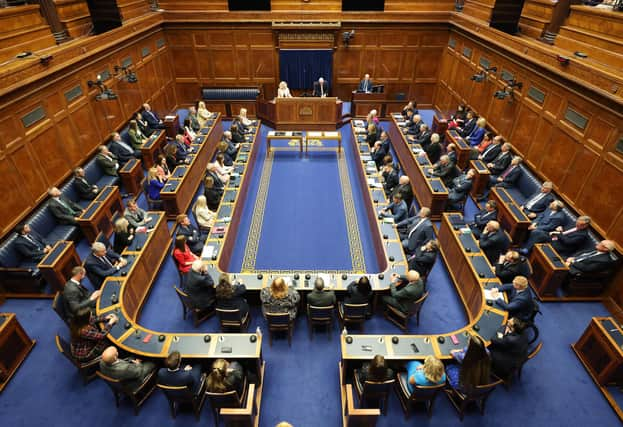Letter: Equal citizenship is not ‘vacuous’ but rather a goal that can't be adapted to post-Brexit arrangements that undermine constitutional equality within the Union


Arthur Aughey’s recent defence of the leader of the DUP against what he referred to as accusations of ‘betrayal’ is based on the argument that in accepting the restoration of Stormont under the terms of the government’s Safeguarding the Union Sir Jeffrey ‘acted pragmatically’ (‘Proclaiming equal citizenship may be magnificent but it’s vacuous,’ February 1)
Aughey’s understanding of the unionist case against the restoration of Stormont is that the case reduces to a ‘vacuous’ argument based on an ‘abstract’ appeal to the ‘principle of equal citizenship’ divorced from ‘pragmatic’ politics.
Advertisement
Hide AdAdvertisement
Hide AdTo say that an argument is vacuous is to claim that it is devoid of substantive content. But contrary to Aughey, unionists opposed to the restoration of Stormont have provided detailed argument informed by expert legal judgment to back their case clearly presented by the leader of the TUV. The TUV position has the virtue of being irrefutable – it is, quite simply, that the January government command paper, Safeguarding the Union, leaves the Protocol/Windsor Framework intact. That is not a vacuous argument contrary the claims of the government and the DUP in their support of a Brexit agreement with the EU that no state committed to the integrity of its territorial sovereignty would ever have negotiated.


Further, Aughey argues that ‘acting pragmatically’ means ‘adapting abstract principle to changed circumstances’. The principle referred to is the requirement of a fundamental constitutional equality of citizenship within the United Kingdom. The implementation of the Protocol/Windsor Framework which Aughey recommended on the basis of ‘pragmatic’ considerations radically differentiates Northern Ireland both constitutionally and economically from the rest of the United Kingdom – a differentiation incompatible with equality of citizenship. The DUP return to Stormont within the terms of Safeguarding the Union is not an adaptation of the principle of equal citizenship – it is in fact a subversion of the principle. Pragmatism by itself is a poor guide to political action for a very simple reason – pragmatism divorced from principle is morally and politically blind.
The political rationale of Aughey’s current position and comments on ‘equal citizenship’ is difficult to understand. Aughey is highly regarded as one of the most sophisticated exponents of unionism as a political identity distinct from Irish nationalism. Irish nationalism is a form of what is referred to as ‘ethnic nationalism’ rooted in the absurd political mythology of an imagined Gaelic nation understood by Irish nationalists to include all the inhabitants of the island of Ireland. This is the nationalism that drove thirty years of republican terrorism post-1969 supported, in effect, by the SDLP and successive governments in the Republic.
Aughey’s exposition of the essence of unionism in his many publications is that it is a ‘civic’ or citizen-based political identity rooted in what the 1912 Covenant referred to as the ‘cherished position of equal citizenship within the United Kingdom’. The use of the word ‘cherished’ conveys that to be a unionist involves a political identity determined not only by the legalities of citizenship but also by a patriotic loyalty to the United Kingdom and for Ulster unionists a multigenerational bond to the province that they call home.
Advertisement
Hide AdAdvertisement
Hide AdThese considerations mean that the principle of equal citizenship is central to unionism and therefore it is foundational for any authentic consolidation of unionism confronted with a threat to the sovereign integrity of the Union such as that presented by the Protocol/Windsor Framework. Contrary to Aughey, appeal to the principle of equal citizenship is certainly not ‘vacuous’ and the principle itself cannot be ‘adapted’ to a post-Brexit arrangement that undermines economic and constitutional equality within the Union
Patrick J. Roche, President, North Down TUV Branch